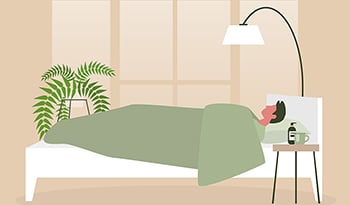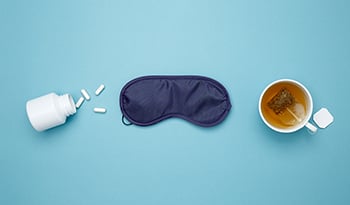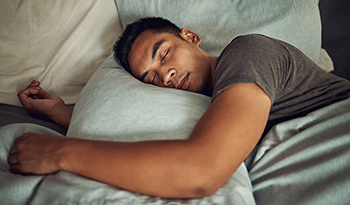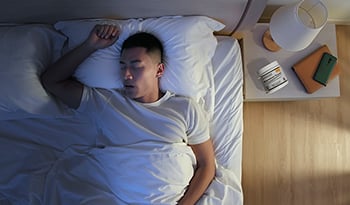Sleep Quality: 4 Reasons Why It’s Important and How to Get It
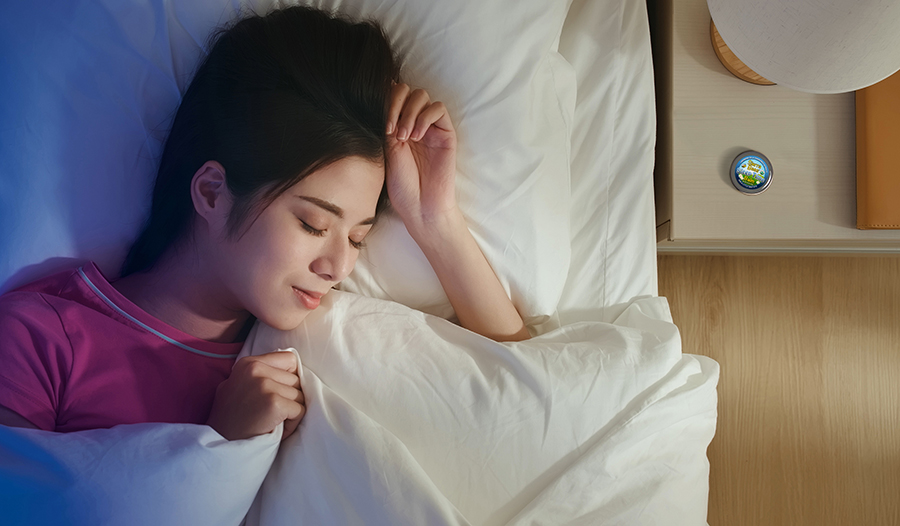
When you sleep well, it’s easy to take sleep for granted. However, it doesn’t take many nights of insomnia to remind us of how critical sleep can be to our lives. While sleep has obvious effects on energy levels, it goes much deeper.
Research shows that problems with sleep can contribute to other health problems including migraines, high blood pressure, heart disease, diabetes, dementia, Parkinson’s disease, mood disorders, and obesity.
4 Reasons To Improve Your Sleep Quality
Sleep has a balancing and restorative effect on the brain and body. Let’s examine two main types of sleep: deep sleep and rapid-eye-movement (REM) sleep. REM sleep appears important for memory processing and solidifying learning. Deep sleep is more restorative. The quality of sleep includes many factors, including how quickly a person falls asleep, the quality and amount of REM and deep sleep, and how rested a person feels upon awakening.
1. Sleep Loss, Blood Sugar, and Obesity
When we don’t get enough sleep, the effects can start to build up and have negative consequences. During deep sleep, the body goes into a deep state of relaxation—decreasing heart rate, blood pressure, and stress on the nervous system. Levels of the stress hormone cortisol decrease while growth hormone is released.
Without enough deep sleep, detrimental changes occur. Higher levels of stress hormones from poor sleep can have an impact on blood sugar. This increases risks for blood sugar problems, diabetes, and obesity. Higher levels of cortisol will also increase overall levels of stress during the day.
Lack of sleep also rapidly affects two hormones related to appetite control: ghrelin and leptin. After just a couple of nights of reduced sleep, leptin levels decrease and ghrelin levels increase, intensifying hunger and appetite. These changes contribute directly to obesity. Sleep problems have been tied to obesity in children. For adults, every hour of sleep less than an average of 7 hours per night increases risks for obesity by 9%.
2. Sleep and Mental Health
Poor sleep also can have a profound negative impact on the brain and nervous system. When an individual sleeps, the brain rebuilds stores of glycogen. Glycogen offers an energy reserve that provides support for more intense levels of brain functioning in times of need. When glycogen remains low, migraine headaches are more likely.
Studies of repeated sleep deprivation show changes in the brain. The hippocampus, amygdala, and prefrontal cortex, areas in the brain associated with stress and memory, become damaged. The subjects developed problems with memory and became more anxious and aggressive. When combined with blood sugar problems, this can worsen the damage long-term and can likely elevate risks for dementia and cognitive decline.
During sleep, the brain engages in housecleaning. Metabolic wastes get removed and antioxidant defenses improve. If these functions get disrupted, it can contribute to brain cell damage and brain cell death. The damage induced from chronic sleep problems likely contributes to increased risks for developing Parkinson’s disease and other problems with brain functioning.
3. Sleep and Heart Health
Sleep problems and chronic insomnia also appear to worsen risks for heart disease. Blood pressure problems remain strongly influenced by poor sleep. One study found that for every hour lost from an adequate night’s sleep, risks for hypertension increased by 37%. However, not every study has found such a striking correlation. The increase in stress hormones resulting from poor sleep, at least in some cases, can lead to increased blood pressure.
Unfortunately, sleep problems have other negative effects on heart health as well. As already mentioned, sleep disruption can lead to decreased antioxidants and increased free radical damage. Also, you often find increased inflammation. The lining of the blood vessels throughout the body can develop problems due to increased endothelin production, a signaling molecule that causes blood vessels to constrict. This can contribute to plaque build up along the arteries, an underlying cause of heart disease.
4. Sleep and Immune Function
It has been known for a while that sleep disruption can cause problems with immune function. A recent study even implicated shift work and sleep disruptions in contributing to an increased risk for viral infections, including coronavirus.
Poor sleep influences immune function in several detrimental ways, including increased levels of inflammation. This increase may contribute to other chronic health problems, as Inflammation is a common, underlying component of most chronic health conditions.
Standard Treatments for Insomnia
Drug therapies for sleep often include antihistamine medications like Benadryl or stronger sedatives, like Ambien and Xanax. Unfortunately, concerning correlations have been uncovered linking sleep medications to increased risks of death. One large study found that any use of sleep medication subsequently doubled the risk of death. The use of sedative-type sleep medication has been linked to increased death from respiratory problems, infections, mood disorders, and accidents.
While it might be worth the increased risks if sleep medications worked well, that doesn’t appear to be the case. In one study, one of the more popular sleep medications was only shown to increase sleep duration by 11 minutes per night on average. Safer, more effective options for treating insomnia would be preferable.
8 Lifestyle Factors That Affect Sleep
While the research is somewhat mixed, there are general recommendations for improving sleep that appear to help. These non-drug approaches include:
- Having a consistent bedtime
- Exercising or engaging in physical activity during the day
- Keeping the bedroom dark during sleep at night
- Avoiding naps longer than 15 minutes during the day
- Abstaining from alcohol or nicotine before bed
- Limiting caffeine consumption to the morning
- Keeping evening meals smaller and not too close to bedtime
- Eliminating computers, televisions, and cell phones from the bedroom
In addition to these approaches, many natural sleep aids have started to show some potential in the published research.
Natural Supplements To Improve Sleep
Melatonin
When it’s dark, our bodies naturally produce the sleep hormone melatonin. Melatonin is a potent antioxidant and anti-inflammatory molecule that not only promotes sleep but may help prevent numerous other health conditions. It also appears to be quite safe with minimal side effects.
The majority of the published evidence suggests melatonin can support better sleep. It typically helps individuals fall asleep and decreases the severity of insomnia. While some studies didn’t find significant benefits, they may have suffered from problems with the type or formulation of melatonin administered as different formulations have not always been well characterized.
Melatonin – Not Just for Sleep: Read more.
Herbal Sedatives
Valerian, passionflower, lemon balm, lavender, chamomile, magnolia bark, and California poppy are herbs that all have been shown to have sedative or calming properties. While most of these herbs do not have enough human clinical trial data to draw firm conclusions, animal studies and preliminary clinical trials in some cases suggest that they may help with stress-induced insomnia.
The herbs listed, when used properly, also have a reasonable margin of safety. However, you should always talk with your doctor before starting any herbs or supplements especially if you are on any medication or have a chronic health condition.
The Best Herbs to Help with Stress: Read more.
Amino Acid Therapies for Sleep
Some amino acids may also have the potential for helping insomnia. Tryptophan, gamma-aminobutyric acid (GABA), and glycine all have sedative properties that can potentially help you get a good night's sleep.
The Ultimate Guide to Amino Acids: Read more.
Tryptophan
Sleepiness after a large meal of turkey is often attributed to its tryptophan content. Research suggests that higher consumption of tryptophan from food appears to correlate with better mood, lower anxiety, and improved sleep. Direct clinical trials with tryptophan have also shown improvements in people struggling with insomnia when given tryptophan before bed.
Tryptophan appears quite safe when used in reasonable quantities: under four grams a day. However, tryptophan is a precursor to serotonin, and individuals on medications that affect serotonin levels, like antidepressants, should check with their healthcare provider before taking the amino acid.
GABA and Glycine
GABA and glycine are amino acids that also act as neurotransmitters, similar to serotonin or dopamine. Both amino acids act to inhibit or slow down brain activity. Based on their inhibitory function, it’s not surprising that they appear to have benefits for sleep. Many standard prescription sleep aids directly affect the GABA system.
One study on GABA for insomnia found that both subjective sleep quality and objective sleep efficacy improved with nightly supplementation. A recent review of all the studies on GABA for sleep showed that for insomnia, it primarily helps individuals fall asleep. The effects appear to be mediated through the relaxing properties of the amino acid itself. Similar to the herbal sedatives mentioned, If stress is keeping you awake, GABA might help.
For glycine, the research is also limited, but promising. Animal studies show that orally administered glycine can effectively increase glycine levels in the brain. Shortly after it’s administered, core body temperature drops. This decrease in temperature is likely related to better sleep since core body temperature typically decreases before the onset of sleep. In a human trial, glycine was shown to improve both subjective and objective scores of sleep without causing waking drowsiness.
Takeaway
Sleep remains vital to our day-to-day and long-term health. Considering the number of people that struggle with insomnia and the potentially concerning side effects from standard prescription sleep medications, other options are needed. Fortunately, the latest research suggests that many natural sleep aids, including melatonin, herbal products, and amino acids may have the potential to improve sleep with minimal side effects.
The 6 Best Natural Supplements for Sleep: Read more.
References:
- Rechtschaffen A, Bergmann BM. Sleep deprivation in the rat: an update of the 1989 paper. Sleep. 2002;25(1):18-24. doi:10.1093/sleep/25.1.18
- Winson J. The biology and function of rapid eye movement sleep. Curr Opin Neurobiol. 1993;3(2):243-248. doi:10.1016/0959-4388(93)90217-m
- Van Cauter E, Spiegel K, Tasali E, Leproult R. Metabolic consequences of sleep and sleep loss. Sleep Med. 2008;9 Suppl 1(0 1):S23-S28. doi:10.1016/S1389-9457(08)70013-3
- Spiegel K, Tasali E, Penev P, Van Cauter E. Brief communication: Sleep curtailment in healthy young men is associated with decreased leptin levels, elevated ghrelin levels, and increased hunger and appetite. Ann Intern Med. 2004;141(11):846-850. doi:10.7326/0003-4819-141-11-200412070-00008
- Miller MA, Bates S, Ji C, Cappuccio FP. Systematic review and meta-analyses of the relationship between short sleep and incidence of obesity and effectiveness of sleep interventions on weight gain in preschool children. Obes Rev. 2021;22(2):e13113. doi:10.1111/obr.13113
- Zhou Q, Zhang M, Hu D. Dose-response association between sleep duration and obesity risk: a systematic review and meta-analysis of prospective cohort studies. Sleep Breath. 2019;23(4):1035-1045. doi:10.1007/s11325-019-01824-4
- Petit JM, Eren-Koçak E, Karatas H, Magistretti P, Dalkara T. Brain glycogen metabolism: A possible link between sleep disturbances, headache and depression [published online ahead of print, 2021 Jan 29]. Sleep Med Rev. 2021;59:101449. doi:10.1016/j.smrv.2021.101449
- McEwen BS. Sleep deprivation as a neurobiologic and physiologic stressor: Allostasis and allostatic load. Metabolism. 2006;55(10 Suppl 2):S20-S23. doi:10.1016/j.metabol.2006.07.008
- Yang Z, Zhang X, Li C, Chi S, Xie A. Molecular mechanisms underlying reciprocal interactions between sleep disorders and Parkinson's Disease. Front Neurosci. 2021;14:592989. Published 2021 Feb 10. doi:10.3389/fnins.2020.592989
- Knutson KL, Van Cauter E, Rathouz PJ, et al. Association between sleep and blood pressure in midlife: the CARDIA sleep study. Arch Intern Med. 2009;169(11):1055-1061. doi:10.1001/archinternmed.2009.119
- Ramos AR, Weng J, Wallace DM, et al. Sleep patterns and hypertension using actigraphy in the Hispanic community health study/study of Latinos. Chest. 2018;153(1):87-93. doi:10.1016/j.chest.2017.09.028
- Yuan R, Wang J, Guo L. The effect of sleep deprivation on coronary heart disease. Chin Med Sci J. 2016;31(4):247-253. doi:10.1016/s1001-9294(17)30008
- Silva FRD, Guerreiro RC, Andrade HA, Stieler E, Silva A, de Mello MT. Does the compromised sleep and circadian disruption of night and shiftworkers make them highly vulnerable to 2019 coronavirus disease (COVID-19)?. Chronobiol Int. 2020;37(5):607-617. doi:10.1080/07420528.2020.1756841
- Sivertsen B, Madsen IE, Salo P, Tell GS, Øverland S. Use of sleep medications and mortality: The Hordaland health study. Drugs Real World Outcomes. 2015;2(2):123-128. doi:10.1007/s40801-015-0023-8
- Kripke DF. Hypnotic drug risks of mortality, infection, depression, and cancer: but lack of benefit. F1000Res. 2016;5:918. Published 2016 May 19. doi:10.12688/f1000research.8729.3
- Buscemi N, Vandermeer B, Friesen C, et al. The efficacy and safety of drug treatments for chronic insomnia in adults: a meta-analysis of RCTs. J Gen Intern Med. 2007;22(9):1335-1350. doi:10.1007/s11606-007-0251-z
- Moroni I, Garcia-Bennett A, Chapman J, Grunstein RR, Gordon CJ, Comas M. Pharmacokinetics of exogenous melatonin in relation to formulation, and effects on sleep: A systematic review [published online ahead of print, 2021 Jan 21]. Sleep Med Rev. 2021;57:101431. doi:10.1016/j.smrv.2021.101431
- Cho JH, Bhutani S, Kim CH, Irwin MR. Anti-inflammatory effects of melatonin: A systematic review and meta-analysis of clinical trials [published online ahead of print, 2021 Feb 10]. Brain Behav Immun. 2021;S0889-1591(21)00038-6. doi:10.1016/j.bbi.2021.01.034
- Baglioni C, Bostanova Z, Bacaro V, et al. A systematic review and network meta-analysis of randomized controlled trials evaluating the evidence base of melatonin, light exposure, exercise, and complementary and alternative medicine for patients with insomnia disorder. J Clin Med. 2020;9(6):1949. Published 2020 Jun 22. doi:10.3390/jcm9061949
- Bruni O, Ferini-Strambi L, Giacomoni E, Pellegrino P. Herbal remedies and their possible effect on the GABAergic system and sleep. Nutrients. 2021;13(2):530. Published 2021 Feb 6. doi:10.3390/nu13020530
- Shinjyo N, Waddell G, Green J. Valerian root in treating sleep problems and associated disorders-A systematic review and meta-analysis. J Evid Based Integr Med. 2020;25:2515690X20967323. doi:10.1177/2515690X20967323
- Wheatley D. Medicinal plants for insomnia: a review of their pharmacology, efficacy and tolerability. J Psychopharmacol. 2005;19(4):414-421. doi:10.1177/0269881105053309
- Friedman M. Analysis, nutrition, and health benefits of tryptophan. Int J Tryptophan Res. 2018;11:1178646918802282. Published 2018 Sep 26. doi:10.1177/1178646918802282
- van Dalfsen JH, Markus CR. The serotonin transporter gene-linked polymorphic region (5-HTTLPR) and the sleep-promoting effects of tryptophan: A randomized placebo-controlled crossover study. J Psychopharmacol. 2019;33(8):948-954. doi:10.1177/0269881119855978
- Byun JI, Shin YY, Chung SE, Shin WC. Safety and efficacy of gamma-aminobutyric acid from fermented rice germ in patients with insomnia symptoms: A randomized, double-blind trial. J Clin Neurol. 2018;14(3):291-295. doi:10.3988/jcn.2018.14.3.291
- Hepsomali P, Groeger JA, Nishihira J, Scholey A. Effects of oral gamma-aminobutyric acid (GABA) administration on stress and sleep in humans: A Systematic Review. Front Neurosci. 2020;14:923. Published 2020 Sep 17. doi:10.3389/fnins.2020.00923
- Bannai M, Kawai N. New therapeutic strategy for amino acid medicine: glycine improves the quality of sleep. J Pharmacol Sci. 2012;118(2):145-148. doi:10.1254/jphs.11r04fm
DISCLAIMER:This Wellness Hub does not intend to provide diagnosis...















































































 Table of Contents
Table of Contents



